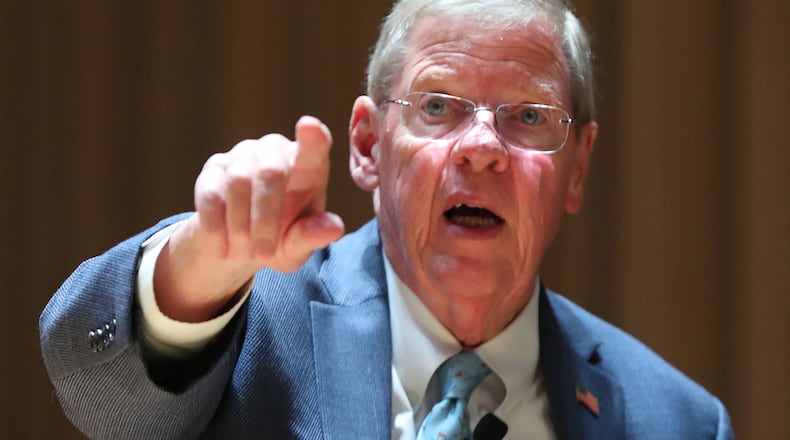An overhaul of the Department of Veterans Affairs’ health care services that the U.S. Senate sent to the president’s desk Wednesday seeks to expand and simplify options for veterans seeking care outside the VA system.
The $52 billion VA MISSION Act constitutes the largest reworking of the VA's health care system in decades, and it's the most significant piece of legislation shepherded into law by Georgia Republican U.S. Sen. Johnny Isakson since he took over as chairman of the Veterans Affairs Committee in 2015.
It’s the “last piece of a great mosaic to reform the veterans benefits to make them contemporary with the 21st century and see to it that the best care, the best attention, the best legislation is in place for our veterans,” Isakson told reporters Tuesday.
The bipartisan measure is backed by the White House and dozens of veterans service organizations, who say it fixes many of the organizational problems created when Congress hastily approved the Veterans Choice Program in 2014 in response to a scandal over VA wait times. But some Democrats and unions warn the effort is inadequately funded and could open the door to the hollowing out of the VA.
Isakson and his allies have sharply disputed that assessment, saying it keeps VA doctors involved in veterans’ health care planning.
“Veterans shouldn’t have to drive a couple hours to the nearest clinic or wait months for an appointment. That’s why we need private health care to fill in the gaps when the VA cannot provide those services,” said U.S. Sen. Jon Tester of Montana, Isakson’s Democratic counterpart on the committee.
The measure would allow more veterans, in consultation with their VA doctors, to seek health care options outside of the federal system. It would eliminate the current set of rules that a vet must live at least 40 miles from a VA clinic or face long wait times to qualify for private care paid with public funds.
Under the new plan, the feds would cover the costs for outside care if a patient requests it and his VA doctor agrees it fits within his best interests. The program — which is used by nearly 40,000 Georgia veterans, according to USA Today — would also expand stipends for family caregivers of all veterans and kick off a process for closing and consolidating old or outdated VA medical facilities, among other changes.
“Quite frankly, it wasn’t very functional,” Isakson said of the original Choice program during an interview. “It didn’t work as well as it should have, but we learned a lot of lessons.”
The Senate passed the bill on a bipartisan 92-5 vote, one of its last acts ahead of the Memorial Day recess. The House previously cleared it on a 347-70 margin.
Every Georgia lawmaker backed the effort save for U.S. Rep. John Lewis. The Atlanta Democrat’s office did not respond to a request for comment.
President Donald Trump has pledged to "immediately" sign the legislation, even as members of his administration had previously pushed for more expansive private care options.
The package is also backed by many veterans service groups, including several that have been critical about the threat of privatizing VA care, such as Veterans of Foreign Wars of the U.S. and Disabled American Veterans.
But the legislation is not without its critics.
The House Veterans Affairs Committee’s top Democrat, U.S. Rep. Tim Walz of Minnesota, opposed it. The plan lacked a “sustainable source of funding,” he warned, and he said current budget limits would require the VA to eventually “cannibalize itself in order to pay for private care.”
More than a dozen union groups also rejected the compromise, including the AFL-CIO and the American Federation of Government Employees, which represents 260,000 workers at the VA. The latter said the measure “kicks the door wide open to VA privatization.”
"Whoever becomes VA Secretary will have all the power necessary to undermine the comprehensive, integrated care and services now provided in-house to veterans," J. David Cox Sr., the group's president, said in a written statement earlier this month. "Nowhere in this 200-page bill does Congress address the serious issues confronting the VA — inadequate funding and staffing to meet the growing demand for care at VA hospitals and clinics."
The measure, more than a year in the making, was also at the center of controversy over the firing of David Shulkin as VA secretary. The Isakson ally was dismissed in March, reportedly in no small part because he clashed with administration appointees over his vision for the Choice program. And lawmakers rushed to pass the legislation in recent weeks since Choice's current funding is expected to run dry by the end of the month.
Nevertheless, the measure’s passage represents a major personal victory for Isakson.
The Senate VA Committee is one of the rare corners of Capitol Hill where bipartisan cooperation still reigns. The panel has churned out roughly a dozen major bills since Trump's inauguration, including measures making it easier to fire problematic employees and expediting the appeals process for disability benefits claims. Isakson appears to have a genuinely warm relationship with Tester, whose actions he defended amid the firestorm surrounding Trump's now-withdrawn VA nominee Ronny Jackson.
Isakson said his approach to legislating at the VA Committee has been to get all stakeholders to the table, including the administration, individual lawmakers and veterans groups that had often sat on the sidelines of major policy debates.
“If you have differences with people you’ve got to identify those differences, sit down with them and see if you can fix it,” Isakson said. “That’s what we did. We went from member to member and we tried to eliminate our problems by solving their problems, and where we couldn’t, explaining why we couldn’t.”
“Failure was not an option,” he added.
About the Author
Keep Reading
The Latest
Featured




